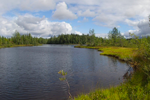The methane cycle in arctic ecosystems tested in a Siberian lake
The March 23, 2020

Lakes producing methane emissions are a major component of the response of arctic ecosystems to climate change. A study integrating biogeochemistry, isotopy and microbiology has shown that, in a Siberian lake, the oxidation of methane in the water column completely consumed the flux from the sediments.
This study published in Scientific Reports mobilised an international consortium co-led by Maialen Barret (Toulouse INP-ENSAT, EcoLab) and Léa Cabrol (IRD, MIO Marseille) EcoLab laboratory (UMR 5245), as part of the ERANET-LAC Methanobase project.
The amplification of the effects of climate change in the Arctic leads to an acceleration of the melting of permafrost, which results in various modifications of landscapes and ecosystems.
Globally, lakes and wetlands are responsible for 70% of methane emissions from natural sources. In particular, boreal lakes account for 26% of total methane emissions from lakes.

Overview of the Siberian lake which was the subject of this study. Credits: Methanobase Project
The metabolic mechanisms and microbial actors involved are not yet well known, and these processes are not yet taken into account in the overall methane emission budgets.
These results are major for the evaluation of the feedback of aquatic ecosystems to climate change.



